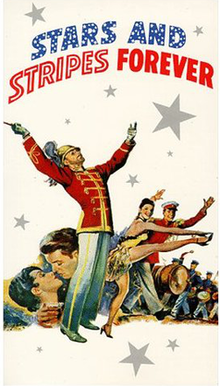Stars and Stripes Forever (film)
| Stars and Stripes Forever | |
|---|---|
 |
|
| Directed by | Henry Koster |
| Produced by | Lamar Trotti |
| Written by |
Ernest Vajda (story) John Philip Sousa (book) |
| Screenplay by | Lamar Trotti |
| Starring |
Clifton Webb Debra Paget Robert Wagner Ruth Hussey |
| Music by |
Leo Arnaud Alfred Newman |
| Cinematography | Charles G. Clarke |
| Edited by | James B. Clark |
| Distributed by | 20th Century Fox |
|
Release date
|
|
|
Running time
|
90 minutes |
| Country | United States |
| Language | English |
| Box office | $3 million (US rentals) |
Stars and Stripes Forever is a 1952 American biographical film about late-19th-/early-20th-century composer John Philip Sousa, played by Clifton Webb. Sousa is best known for his military marches, of which "The Stars and Stripes Forever" is arguably the best known.
While loosely based on Sousa's autobiography Marching Along, the film takes considerable liberties and dramatic license, often expanding and examining themes and passages in the book.
In the 1890s, Sergeant Major John Philip Sousa, the director of the United States Marine Band, leaves the Marine Corps after his enlistment expires to form his own band because he is not paid enough to provide for his wife Jennie (Ruth Hussey) and their children. As a favor for his splendid service, he is allowed to take along Private Willie Little (Robert Wagner), who is credited with designing the Sousaphone and naming it after his mentor (in real life, Sousa himself designed the instrument).
Willie persuades Sousa to go with him to a "concert" where some of Sousa's songs will be performed. In fact, it is a music hall, where Willie's girlfriend, Lily Becker (Debra Paget), is one of the performers. When the police raid the place for indecency (by 1890s standards), the trio barely manage to get away.
Sousa forms his band and is very successful. A mention in the book that Sousa discouraged the married men in the band from bringing their wives on tour is expanded into a subplot where Willie and Lily get married in secret so they can continue touring together with Sousa. An episode shows Sousa's Band playing at the Atlanta, Georgia Cotton States and International Exposition (1895), despite the attempt by Colonel Randolph (Finlay Currie) to cancel their contract. Sousa has his musicians play "Dixie" as they march up, putting the crowd in a cheerful mood. A listing of his song list for the performances includes "Dixie" as every second one. The crowd cheers, and Randolph welcomes Sousa. This stays relatively close to fact.
...
Wikipedia
